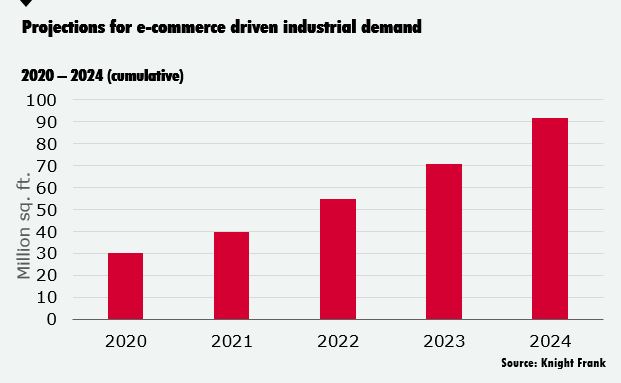Rise of Online Retail Sales Will Drive Demand for 92M sq ft UK Warehouse Space
Posted by Knight Frank Newcastle on 26th October 2020 -

The growth of ecommerce could drive demand for 92 million sq ft of warehouse space across the UK by 2024, according to new analysis from global real estate advisor Knight Frank.
The analysis considers how the growth of online retail sales, which currently account for 26.6% of retail sales and peaked at 33.4% in May during the lockdown, will impact the demand for warehouse space across the UK.
By examining five-year data for online sales, take-up of warehouse space and retailers’ warehousing networks, Knight Frank forecasts that for every additional billion pounds of online retail sales, 1.36 million sq ft of warehouse space is required.
This model suggests that the spike in online sales in 2020 alone will create demand for an additional 30 million sq ft of space, rising to a total of 92 million sq ft by 2024 when it is forecast that online sales will hit a sustained level of 32% of UK retail sales.
This growth will be driven in part by the grocery sector, which has seen online sales more than double from £681 million in July 2019 to £1.44 billion in July 2020, and now comprise 10.8% of all consumer spending on food.
Knight Frank expects this shift in consumer behaviour to remain after the Covid-19 pandemic and forecasts that growth of online grocery sales alone could create demand for 7.1 million sq ft of warehouse space to 2024.

Knight Frank’s market data suggests the rise of ecommerce is going to intensify pressure on the UK’s limited supply of modern, well-located warehouse space.
Current data shows low availability of industrial space across the UK, with a vacancy rate of just 5.6%, with the supply of urban logistics space in and around major cities, critical for last-mile delivery, even more constrained.
According to Knight Frank’s data, the vacancy rate in Greater London is below 3%, with low levels of availability across the South East as well as in Manchester, Birmingham, and Bristol.
Despite the favourable supply-demand dynamics, the scarcity of available land and delays to construction and planning due to Covid-19 is stymieing the development of additional warehouse space. Across the UK, construction starts since April are down -58% year-on-year and planning consents granted are down -21%.
Charles Binks, Department Head Logistics and Industrial, Knight Frank, said: “The rise of ecommerce has been one of the fundamental drivers of demand for warehouse space over the past five years, and our analysis shows this trend is only going to accelerate as consumer behaviour continues to shift in favour of online purchasing.
“The utilisation of technology in warehouses and any future need for social distancing will impact on space requirements, but is clear the projected rise in online sales is going to create a huge demand for warehousing over the next four years. The question is whether supply can keep pace.
“Supply is already very constrained in and around London and major cities, with the availability of land a major challenge for developers. As online sales accelerate, we may see new industrial formats emerge as supply-chains adapt.
We expect that some space will need to be converted or repurposed from existing uses to meet the estimated 92 million sq ft the UK will need to service the forecast growth in online sales and home deliveries over the next four years.”




